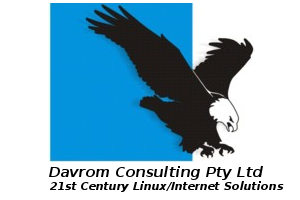





Back to Newsletters DAVROM CONSULTING Newsletter - Issue # 16 - Dated: Thu Jan 30 22:14:43 EST 2003 From the desk of David Clark I always know when I am running behind on a newsletter - someone always says, "I haven't seen one of your newsletters for a while." So here it is. Two new SCO products out this month - read on. My thanks to those who have been using and commenting on our customer access system here and if you are a DAVROM customer but have not received your access information yet, please let me now and I will make sure your account number and password are sent to you. I would like to thank the reader for their time in reading this newsletter. David.M.Clark Coping with the MS authentication change Remember when you had to change your Windows98 PC registry to "Plain Text Passwords" so that you could utilise the MS share folders on your UNIX/Linux server running SCO VisionFS or Samba? I have seen with the increased upgrading of older PCs to the newer MS XP and 2000 PCs on sites a little hickup has again arisen. With the mix of new XP/2000 PCs and the older Windows95/98 PCs, the XP/2000 PCs can't access the share folders like the older PCs can. The issue here is you need to change your server's version of Samba or VisionFS to the latest release to allow the XP/2000 PCs to "see" the SCO or Linux server. Even sites that have been running with encrypted passwords for the older Windows95/98 PCs still do not escape this issue of XP and 2000 not being able to access the server via Microsoft Client Network browsing. For those running SCO VisionFS you will need to get the last released version of 3.1 to grant access to the XP/2000 PCs. As for Samba, it is always good to get the later version anyway. Both these products are available as free distributions. SCO OpenServer 5.0.7 On the 14th of January this year, SCO announced the releasing of its latest version of SCO OpenServer. SCO OpenServer 5.0.7 follows the previous releases of its product "bundles" as Enterprise System, Host System, and the Desktop System. Included in the media kit are some extras including eval and demo version of the product. It includes the following new, fully-supported products: Samba, Mozilla, OpenSSL, OpenSLP, and OpenSSH, OpenLDAP, and many other commonly used Open Source libraries and tools. Perl and Apache are now fully integrated into the system, and Apache has been enhanced with support for PHP, XML, ASP, and other Apache technologies such as mod_perl. For text-based web browsing, Lynx is now provided with this release. The Squid caching proxy server, BIND, FTP Daemon, and IP Filter have been updated. SCO OpenServer 5.0.7 has new hardware support for USB, EIDE CDRW, LS-120/240 drive support, updated graphics, updated network adapters and hard drive adapters. It also has new processor and chip set support. In line with SCO OpenServer 5.0.6 it follows the same upgrade path and licence compatibility as existed between a 5.0.5 to 5.0.6 upgrade. (Same user licences etc). As SCO OpenServer has remained a primary product focus for DAVROM CONSULTING along with our other Linux and Internet product offerings, we have setup a detailed web page on SCO OpenServer 5.0.7: http://www.davrom.com/osr507.html If you have any questions concerning 5.0.7, its pricing and availability please contact us. Some industry items SCO: January 2003 - SCO announces the release of SCO OpenServer 5.0.7. This follows SCOs comittment to maintaining the lifespan of SCOs traditional UNIX product. SCO: SCO released SCOoffice Mail Server 2.0 - This awesome product offers a complete replacement to MS Exchange and now fully supports Microsoft Outlook collaboration with shared calendars, folders, discussion groups, and address books. The mail server also integrates with 3rd party tools including backup and anti-virus solutions. For more information: http://www.sco.com/products/SCOoffice/mail/ RedHat: IBM announced support of Red Hat Linux Advanced Server across its entire line of eServer platforms. You've heard all about Red Hat Linux Advanced Server. This month we offer an in-depth view of Advanced Server's high-availability clustering feature. And we help you see the differences between Advanced Server and Red Hat Linux 8.0. Tech Tip Controlling the number of pings - I was asked recently if there is a way to ping a network device for a specific number of times. This is done under SCO OpenServer and most Linux platforms with the command: ping -c 3 192.168.1.3 which results in: PING 192.168.1.3 (192.168.1.3) from 192.168.1.2 : 56(84) bytes of data. 64 bytes from 192.168.1.3: icmp_seq=1 ttl=64 time=0.768 ms 64 bytes from 192.168.1.3: icmp_seq=2 ttl=64 time=0.726 ms 64 bytes from 192.168.1.3: icmp_seq=3 ttl=64 time=0.717 ms --- 192.168.1.3 ping statistics --- 3 packets transmitted, 3 received, 0% loss, time 2014ms rtt min/avg/max/mdev = 0.717/0.737/0.768/0.022 ms Consider utilising a ping count in a shell script such as: PINGCOUNT=`ping -c 3 192.168.1.3 | grep icmp | grep -v grep | wc -l` and then use the value of PINGCOUNT, in this case should be "3", to determine the action of a script. Back to Newsletters 





Website design by Davrom Consulting Pty Ltd This site is fully tested with Google Chrome and Firefox web bowsers Home Page | Support | Misc | David's Pages | Podcasts | Contact Us | Blog |
